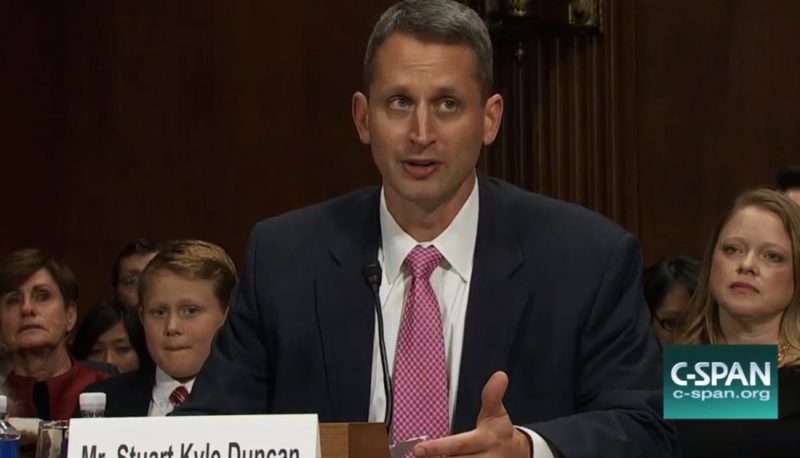“Confirmed Judges, Confirmed Fears” is a blog series documenting the harmful impact of President Trump’s judges on Americans’ rights and liberties. Cases in the series can be found by issue and by judge at this link.
Trump Fifth Circuit judge Kyle Duncan was the deciding vote and author of a 2-1 majority opinion in January that gratuitously attacked the transgender litigant in the case and made it abundantly clear to future transgender litigants that Judge Duncan views them with contempt. The case is U.S. v. Varner.
The plaintiff was convicted and sentenced in 2012 before she transitioned. In 2018, she asked the district court to change the name recorded on her judgment to Kathrine Nicole Jett. On the grounds that the request didn’t fall within the “correcting the record” instance when a judgment can be reopened and modified, the district court denied the motion. She appealed to the Fifth Circuit, including a request that the appeals court use feminine pronouns.
Unfortunately for her, she had the misfortune of drawing a three-judge panel that included Kyle Duncan.
In his majority opinion, Duncan set forth his reasons for deciding that Jett’s request did not constitute one to correct the record, a conclusion that dissenting judge James Dennis agreed with.
That should have ended the court’s inquiry. But Duncan chose to be guided by his strong anti-transgender bias and went much further than necessary to decide the case.
First, instead of simply affirming the lower court’s denial of the plaintiff’s request, he wrote that the lower court never had jurisdiction to even consider it in the first place, so that it should have been dismissed. As Judge Dennis explained, the Fifth Circuit regularly denies motions to reopen the record, considering them on the merits rather than dismissing them. Based on the rest of Duncan’s opinion, needlessly and inaccurately categorizing Jett’s request as an “unauthorized motion” seems intended to deprive it of legitimacy.
Second, Duncan insisted on using the wrong gender pronouns, claiming that to do otherwise would constitute bias toward a transgender litigant’s legal position. That inaccurately frames refusal to use the right gender pronouns as the neutral position. Such lack of respect for the dignity of parties before the court should have no place in our nation’s judiciary. Indeed, Judge Dennis responded:
As the majority notes, though no law compels granting or denying such a request, many courts and judges adhere to such requests out of respect for the litigant’s dignity.
The dissent also pointed out that Duncan could have avoided the entire issue by writing a short opinion without using pronouns to refer to the plaintiff. Instead, Duncan chose to frame Jett’s request that the panel treat her with courtesy as a much broader request to order the entire federal government to use the gender pronouns she asked for. This gave him a chance to expound on the perils of treating transgender people with respect. For instance, except in direct quotes, he refused to use the word “transgender,” preferring to repeatedly use “gender dysphoric,” a term that originated in the psychiatric Diagnostic and Statistical Manual of Mental Disorders (DSM). He also raised the possibility that a future litigant might ask a court to use pronouns such as “ze” that are designed to be genderless, which he claimed would confuse people. He declared:
We decline to enlist the federal judiciary in this quixotic undertaking.
Unfortunately, no one should be surprised by Judge Duncan’s opinion. As with so many Trump judges, his disturbing record as a nominee left little doubt of his animus toward LGBTQ+ people—and little doubt that it would influence his decisions as a judge.

